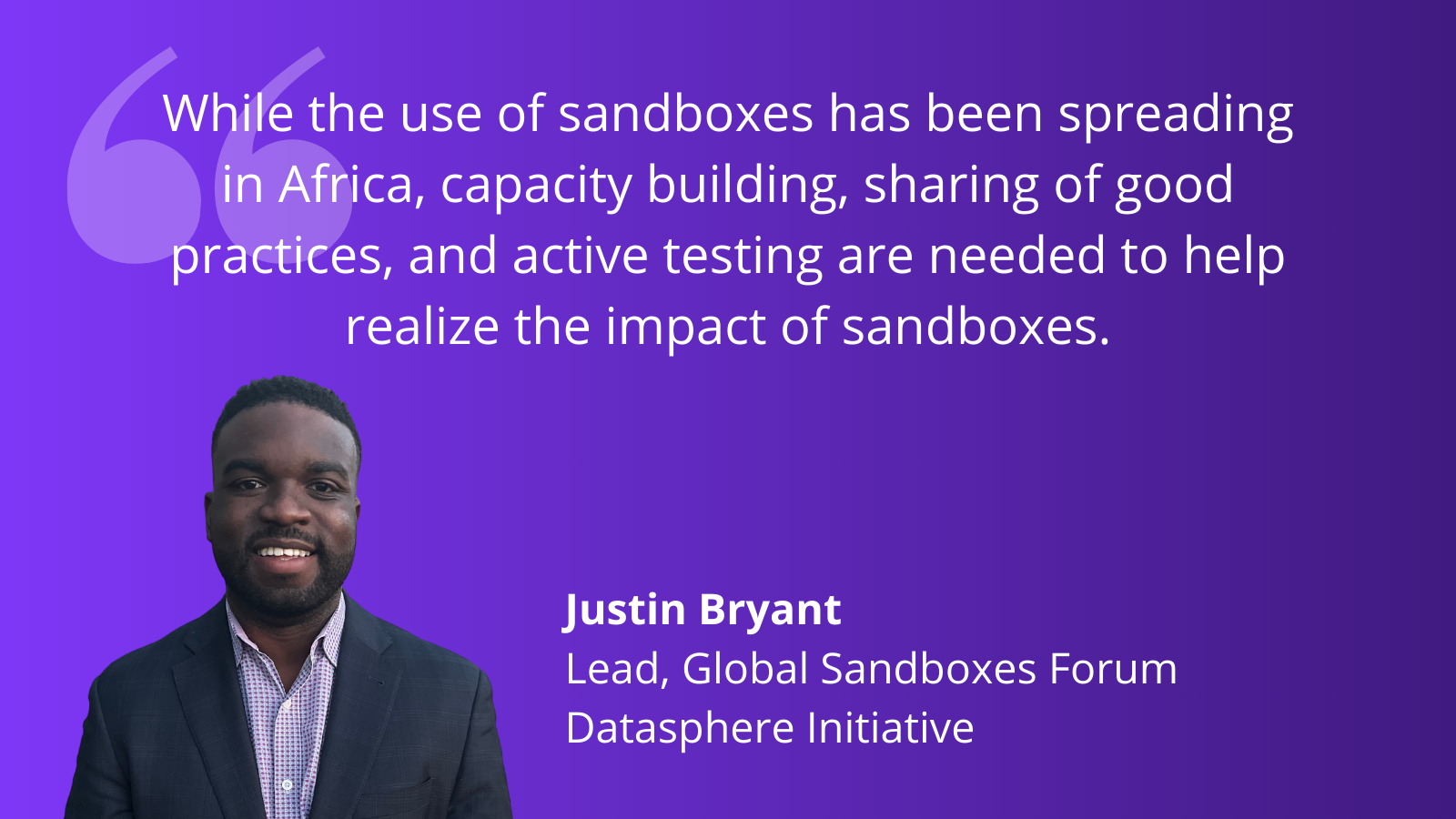This blog is part of a series from the Datasphere Initiative’s Africa Forum on Sandboxes for Data. The Datasphere Initiative is asking data policymakers and shapers across the region why Africa needs to responsibly unlock the value of data for all and how sandboxes might help catalyze ideas into action. Read more about the Africa Forum here and the blog series here.
Justin Bryant, Lead, Global Sandboxes Forum, Datasphere Initiative
Data challenges exist in all sectors, and their impacts are far-reaching. Governments and the private sector around the world are struggling to deal with data’s multidimensional nature. Attempting to engineer solutions, depending on siloed frameworks and uncoordinated actions is bound to be futile in the face of the interdependencies of a contemporary global society. For me responsibly unlocking the value of data for all requires genuine progress and a new level of dynamic collaboration is needed. That is why the Datasphere Initiative with the support of the Hewlett Foundation has recently kicked off an Africa Forum on Sandboxes for Data.
Access to data is crucial for transportation innovation, migration, and sustainability efforts across borders but data-sharing standards and protocols are fragmented. In health, cross-border access to quality health data is crucial for research, disease control, and drug development, yet we still struggle to share data responsibly and balance openness with risk.
It is important to underscore that no country or region has mastered this yet. As such, this creates boundless opportunities for Africa when it comes to the transformative potential of data, as the continent is not locked into legacy instruments like certain other regions and can seize this moment to provide leadership on the global stage.
For example, the rate of AI investing worldwide is growing most rapidly in Africa and the Middle East. Part of ensuring that large learning models foster equitable and inclusive applications for the benefit of humankind as this technology rapidly advances requires us to grapple with the fundamental data access, sharing, management, and quality challenges that have been on our plates for quite some time.
Legal and regulatory frameworks for data are leaving gaps in critical safeguards, as well as shortages of data-sharing mechanisms. The AU Data Policy Framework and the AfCFTA also will help with some of this in terms of advancing more resonant regulatory guidance. But implementation is key—we still need more innovation and experimentation not just to develop agile policy but to ensure that the approaches we are taking to data governance are technically sound, pragmatic, and contextually adapted.
This is where sandboxes can come in. Sandboxes are collaborative environments that test technologies and data practices against regulatory frameworks, or experiment with new uses, capabilities, and means of governing data. Policymakers, regulators, industry experts, technologists, academics, civil society groups, and all sorts of people provide input into these sandboxes to ensure that their outputs resonate across a comprehensive audience and reflect a broad consensus.
Sandboxes produce benefits for a multitude of actors:
- For regulators, they create a low-risk model for testing challenging ideas and offer an opportunity to engage with the latest technological developments, building trust among stakeholders.
- For companies, particularly startups and MSMEs that lack considerable resources to allocate to compliance and need to focus their funds on scaling the business, sandboxes help foster legal and regulatory certainty, facilitating market entry and fairer, more robust competition.
- And for the general public, sandboxes can promote an understanding of emerging technologies, practices, rules, and norms.
While the use of sandboxes has been spreading in Africa, capacity building, sharing of good practices, and active testing are needed to help realize the impact of sandboxes beyond the fintech sector where the vast majority of efforts have occurred.
The Africa Forum on Sandboxes for Data is moving ahead with the support of some amazing partners including the Centre for the Study of the Economies in Africa (CSEA), the Africa Center for Economic Transformation, the Global Partnership for Sustainable Development Data, Lawyers Hub, Telesto Strategy, the African Parliamentary Network on Internet Governance, Smart Africa, African Development Bank, the African Data Leadership Initiative (UN Digital Impact Alliance), Impact Hub Accra, and the Transform Health Coalition, just to name a few.
- Read more from other contributors in this blog series here
- Read more about the Africa Forum on Sandboxes here
- The Datasphere Initiative has launched a complete online learning experience: “A Guide to Cross-Border Sandboxes for Data.” Enroll for the online course here.
Justin Bryant is the Lead of the Global Sandboxes Forum at the Datasphere Initiative. His background spans the intersection of technology, law, and global policy, and he is experienced with the policy frameworks emerging amidst the shifting landscape of digital geopolitics. He is the Secretary of People-Centered Internet, a nonprofit that partners with communities to build resilience through digital infrastructure and ecosystems, and a Research Fellow at the Gould Center for Conflict Resolution at Stanford Law School.
Justin has been an operator and advisor to several startups, including Alternativ (now Compound Wealth), where he was Head of Operations. He has helped clients comply with global technology laws and craft data management and digital strategies both as a consultant and during his tenure in the Cyber, Privacy, and Data Innovation practice at Orrick, Herrington, and Sutcliffe.
He is also a thought leader in global South digital development, having written on digital rights and data protection in Africa, moderated various dialogues on African digital policy, partnered with organizations to build products in the digital regulatory space, and traveled on delegations with the U.S. State Department to build partnerships with technology stakeholders in Africa.
Justin holds a B.A. in Public Policy from Duke University, an MSc in Global Affairs from Tsinghua University—where he was a Schwarzman Scholar, an LL.M in European and International Business Law from the University of Vienna, and a J.D. from Stanford Law School. He is a Salzburg-Cutler Fellow in International Law and Public Service and a Certified Information Privacy Professional-Europe (CIPP-E). He lives in San Jose, California, USA.




